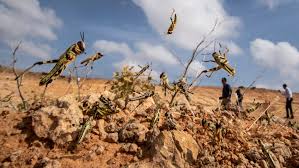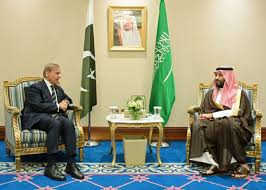Pakistan gets China aid to fight locust

Karachi: China on Monday sent the first batch of aid fir Pakistan to fight the locust.
Recently, the worst locust plague in 27 years has broke out in Pakistan. The affected areas are mainly concentrated in Punjab, Balochistan and Sindh Province.
The outbreak of the locust plague seriously damaged the cotton, wheat and corn plants in the relevant producing areas as well as livestock pastures, causing severe threats to agriculture and food security of Pakistan. In response to the threat of locust plague, Pakistan Prime Minister Imran Khan declared a state of emergency in February this year and mobilized the power of the whole country to eliminate locusts and to protect crops from locust attack.
Early this year, Pakistani government submitted a request for locust control assistance to Chinese government. Although China has spared no effort to fight the novel coronavirus epidemic nationwide, it attached great importance to the request of her Pakistani friend and brother to control locusts and took immediate action. Many Chinese government departments have been repeatedly communicating and discussing the specific assistance program.
On February 23, the Chinese government ’s locust eradication working group set off for Pakistan for inspection. The working group consisting of officials and experts from various department was led by the Ministry of Agriculture and Rural Affairs of the People’s Republic of China. Wang Fengle, chief expert of the National Agricultural Technology Extension Service Center of China, was the team leader. In the early morning of February 24, after arriving in Karachi, the working group held seminars with officials and experts of Pakistani government to hear briefings, and conducted field inspections, and exchanged views on plans for locust control. From February 24th to March 4th, the working group respectively visited Sindh, Balochistan, and Punjab province to conduct field inspections during their stay in Pakistan, together with officials of the Federal Government’s Ministry of Food Security and Research and the three provincial plant protection departments.
The working group also met with officials of the inspected areas. During the stay in Sindh province, the working group covered more than 800 kilometers one day and conducted field inspection to the Tarparkar region in the eastern part of the province. In Balochistan province, the working group went to the Chilgazi region and the Tobuk desert in Darbantin, collected locust specimens on site and conducted detailed investigations on the causes, characteristics, and actual local conditions of the locust plague in Pakistan.
The locust plague this time in Pakistan was mainly caused by desert locusts, with both local breeding and migratory. More rainfall and low temperature last year in the desert area provided a favorable environment for the breeding of locusts. Failure to manage it in time will cause serious threats to Pakistan ’s agriculture and animal husbandry.
After a series of discussions with the Pakistan side and through field inspections, the Chinese working group proposed a combination of short-term emergency prevention and long-term sustainable control, chemical prevention and green prevention and control, air plane pesticide application combined with large-scale ground equipment planting and spreading, as well as control of local incubation combined with the prevention of migratory insect pests, and came up with a four-stage comprehensive management plan of precise monitoring, district management, effective prevention and control as well as technological support based on the Pakistan’s special situations and needs.
The above-mentioned master control plan proposed by the Chinese working group has been highly commented by the Pakistani side.
The Chinese Embassy and Consulate General in Pakistan also attached great importance to the working group on exterminating locusts. H.E. Mr Yao Jing, Chinese Ambassador to Pakistan, coordinated and guided the inspection work of the working group in Pakistan and listened to the work report. Mr. Li Bijian, Consul General of China to Karachi, accompanied the working group throughout the visit in Sindh and Balochistan province. Mr. Long Dingbin, Consul General of China to Lahore, met with the working group and attended the working group’s discussion with government of Punjab province. The Economic and Commercial Office of the Chinese Embassy to Pakistan also sent an officer accompanying the inspection work through the whole trip in Pakistan. During the investigation of the working group in Sindh province, Chinese Consulate General in Karachi held special media briefing for the working group. Pakistani medias also sufficiently reported the working group’s activities during its visit in Pakistan.
During the inspection in Pakistan, the Chinese working group received warm and thoughtful hospitality as well as great support and cooperation to the inspection work from all levels of governments and relevant departments of Pakistan. The Chinese side expresses its sincere thanks therefor.
As emphasized by Mr. Li Bijian, Consul General of China to Karachi, in the media briefing on February 27, at the critical moment when government and people of China are fully fighting the novel coronavirus epidemic, China took Pakistan’s crisis as its own issue and considered in advance what Pakistan may need. The working group was sent to Pakistan to inspect the situation of the locust plague, and proposed a feasible assistance plan for the locust control, which fully reflects the hard-core friendship and brotherhood between the Chinese and Pakistani governments and peoples. China and Pakistan will surely win the two battles against the novel coronavirus epidemic and the locust crisis with collective efforts of both countries.
According to the assistance plan initially agreed between China and Pakistan, the Chinese government will provide malathion and high-efficiency remote sprayers and other control materials to the Pakistani government for free. The first batch of materials including 50,000 liters of malathion (50 tons) and 14 air-powered high-efficiency remote sprayers arrive in Karachi on chartered flight on March 9, 2020, namely today. The rest and follow-up materials will be delivered to Pakistan as soon as possible.
In addition, although China has not yet completely conquered the novel coronavirus epidemic, it still provided Pakistan with 12,000 kits for novel coronavirus detection to express the profound friendship of the Chinese people to the Pakistani people as iron buddies. These kits arrived in Karachi with the chartered flight and have been handed over to the Pakistani side. China has already provided 1,000 kits previously to Pakistan. It is hoped those kits will positively help Pakistan to cope with the epidemic.





